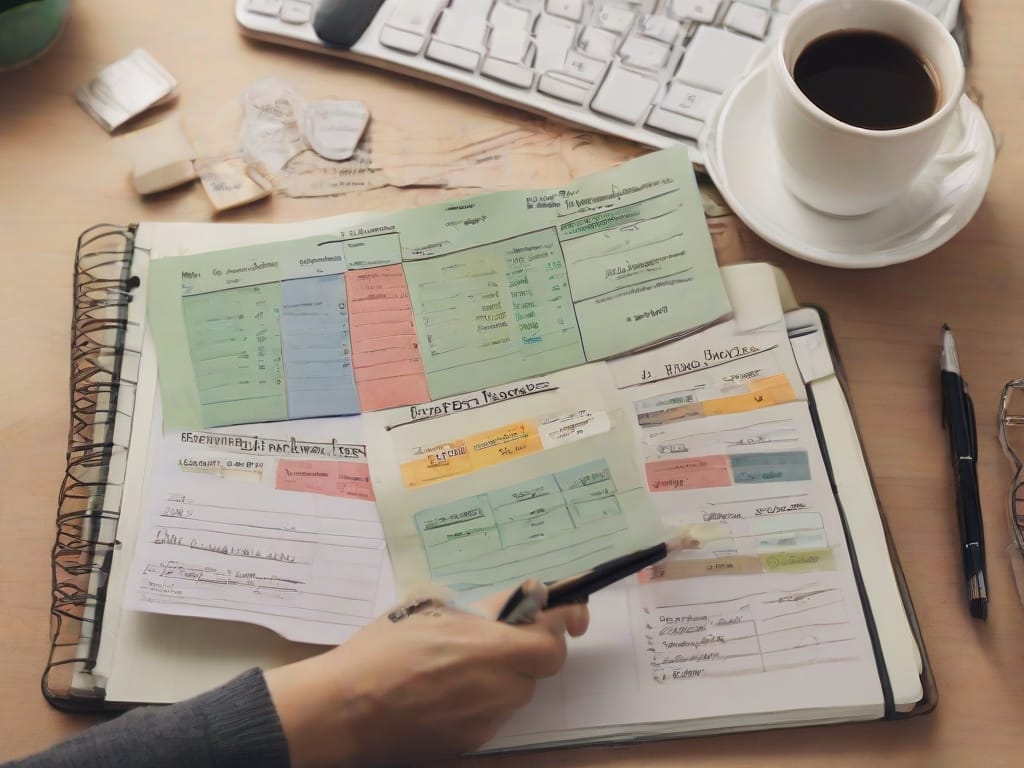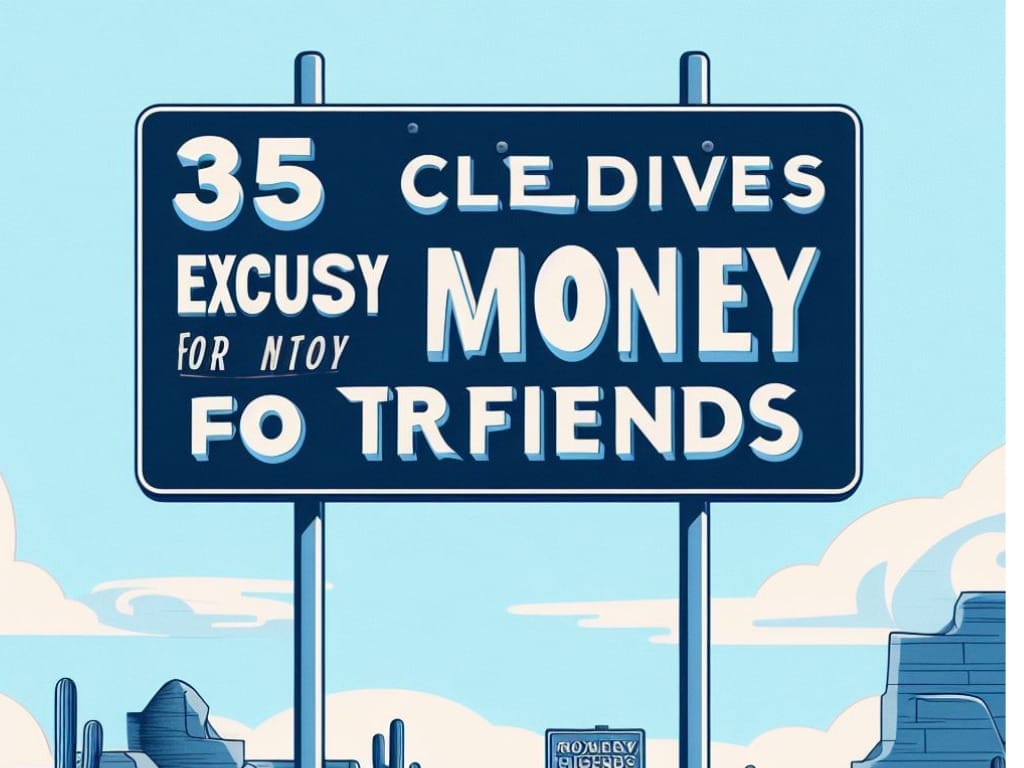Introduction
Ever found yourself caught inside the difficult web of a friend asking for monetary assistance? It’s a state of affairs lots of us have faced, toeing the line between being a good buddy and keeping our financial well-being. The artwork of saying ‘no’ without straining relationships calls for finesse and, you guessed it, an amazing excuse. So today in this guide you will learn ‘ Good excuses for not giving money to friends.
Let’s dive into the realm of good excuses for no longer giving cash to friends, and exploring methods to navigate those sensitive situations whilst safeguarding your monetary limitations. After all, being a friend doesn’t imply turning into a walking ATM.
Key Takeaways
Congratulations! You’ve simply launched into a journey of financial empowerment within your friendships. By delving into our guide on “35 Clever Excuses to Politely Decline Giving Money to Friends,” you’ve gained precious insights into keeping both your relationships and your monetary properly being. Here’s what you can do away with:
- Financial Boundaries Matter: Learn the importance of placing and keeping private economic limitations to secure your monetary health.
- Consequences of Constant Giving: Understand the ability repercussions of constantly lending cash to friends and the way it can impact your monetary balance.
- 35 Clever Excuses for Every Occasion: Arm yourself with a repertoire of excuses, from prioritizing your economic desires to encouraging independence to your friends.
- Effective Communication Strategies: Discover pointers on gracefully declining requests for money, fostering open conversation, and maintaining honesty within your friendships.
- Encourage Responsible Financial Behavior: Help your buddies recognize the significance of managing their price range independently and seeking alternative assets of the guide.
Remember, being a terrific buddy doesn’t imply jeopardizing your monetary well-being. With those insights, you’re equipped to navigate the delicate dance of friendship and finance with finesse. Now go forth, set those barriers, and construct more potent, financially sound connections!

The Value of Having Financial Limits
II. Define the Significance of Having Personal Financial Boundaries
A. Constructing the Stronghold of Monetary Security
Establishing non-public monetary obstacles corresponds to building a castle around your economic well-being. It entails developing a price range, putting limits, and expertise the delicate balance between generosity and monetary prudence. In a international full of monetary uncertainties, those limitations function as a defense, defense of your economic balance.
B. How to Say “No” with Style
Saying ‘no’ to lending cash can be challenging, especially when it entails buddies or family members. However, it’s important to recognize that this ‘no’ isn’t always a rejection but a dedication to economic duty. It’s about keeping manage over your price range, and ensuring that your monetary desires don’t go through in the process.
III. Talk About the Possible Drawbacks of Frequently Giving Friends Money
A. Straining Relationships and Unraveling Bonds
Constantly giving money to buddies and own family can pressure relationships, turning the dynamics from non-public to financial. The preliminary pleasure of helping may supply manner to resentment and expectancies, jeopardizing the very basis of those connections. It’s a delicate dance between being supportive and ensuring that your financial obstacles are reputable.
B. The Unpaid Debt Ripple Effect
When cash exchanges arms without clean terms, the ripple effect can be felt a way and huge. Unpaid money owed can result in resentment, and what started as an easy economic transaction can morph right into a complex web of strained relationships. It’s critical to lend with clear expectations, fending off misunderstandings that could harm your financial balance and your private connections.
35 Clever Excuses for Not Giving Money to Friends
Excuse 1: Borrow Money Blues
Sorry, I’m currently experiencing an economic downturn myself. Life has its ebbs and flows, and now, I find myself in a piece of a financial dip. Borrowing cash wouldn’t be truthful to you or me, and each folks needs to navigate those demanding situations independently.
Excuse 2: Tightening the Purse Strings
I’m in a phase of tightening my budget. With the ever-present specter of expenses, lending at the moment would strain my financial situation. It’s not about reluctance but rather a conscious effort to manage my resources more judiciously.
Excuse 3: Financial Rain Check
Let’s revisit this when my financial situation is more stable. I believe in making decisions when the timing is right, and currently, lending may not align with my financial goals. A rain check allows us to reconsider when circumstances are more favorable.
Excuse 4: Saving for a Rainy Day
I’m diligently saving for sudden charges. Life is unpredictable, and having an economic cushion is important. Unfortunately, this means I can’t spare any cash in the interim. It’s approximately being organized for something curveballs life can also throw our way.
Excuse 5: Financial Restraints
Unfortunately, my contemporary finances don’t allow for lending. Budgets are like roadmaps, and straying from them can lead to monetary detours. I’m adhering to my price range to ensure financial stability and keep away from useless dangers.
Excuse 6: No Cushion for Interest Rates
I’m not comfortable with the idea of dealing with interest rates. Borrowing often comes with additional financial burdens, and I prefer keeping things straightforward. It’s not a lack of trust but rather a preference for simplicity and transparency.

Excuse 7: Prioritizing Family Finances
I’m currently allocating my funds to support family needs. Family comes first, and financial decisions should align with our familial responsibilities. It’s about ensuring that the resources are directed where they are most needed.
Excuse 8: Friendship over Finances
I value our friendship too much to let money matters come between us. Money has the potential to strain relationships, and I prioritize preserving our friendship. It’s a choice to safeguard the bond we share.
Excuse 9: Unexpected Expenses Ahead
Anticipating some unexpected expenses, so need to keep funds intact. Life is full of surprises, and I want to be prepared. Lending now might compromise my ability to handle unforeseen financial challenges.
Excuse 10: Strapped for Cash
At the moment, I simply don’t have the extra money to spare. We all go through levels wherein budgets are tighter than typical, and this is one of those instances for me. It’s now not an everlasting state, but a transient constraint.
Excuse No. 11: Managing Debt
I’m in the process of repaying my very own money owed and can’t take on extra. Responsible economic management includes addressing present money owed earlier than taking up new monetary duties. It’s a step toward achieving a debt-unfastened destiny.
Excuse No. 12: Making a Budget
Currently, I’m operating on an economic plan, and lending isn’t in shape. Planning is critical for monetary fulfillment, and I’m focusing on aligning my decisions with a dependent economic strategy. It’s approximately putting the degree for future balance.
Excuse 13: Safeguarding Relationships
I believe refusing to lend helps in keeping relationships intact. While money can be a divisive topic, prioritizing relationships over financial transactions is my way of maintaining harmony and trust.
Excuse 14: Learning from Bad Experiences
Past bad experiences taught me to be cautious with lending money. Life’s training shapes our decisions, and I’ve discovered that being circumspect approximately monetary transactions is a wise approach.
Excuse 15: Emphasizing Financial Guidance
I’m consulting with an economic advisor, and lending isn’t endorsed. Seeking expert recommendations is a proactive step closer to making informed financial choices. It’s about relying on expertise to guide my picks.
Excuse 16: Setting Personal Boundaries
I’ve set clear boundaries regarding lending money to friends. Establishing limitations is crucial for private well-being, and it’s not a mirrored image of our dating but instead a commitment to self-care.
Excuse 17: Ensuring Full Repayment Ability
I need to make sure I can pay off any borrowed cash. Responsible lending entails making sure the capability to meet compensation duties. It’s about being honest with each event involved.
Excuse 18: Suggested Alternative Solutions
Rather than lending, permits exploring alternative answers collectively. Sometimes, there are creative ways to address monetary desires without resorting to borrowing. I’m open to brainstorming and finding a together beneficial answer.
Excuse 19: Promoting Independence
I believe in encouraging self-reliance; let’s find another way. While assistance is valuable, promoting independence fosters personal growth. It’s about empowering each other to navigate financial challenges independently.
Excuse 20: Planning for Future Stability
Currently, I’m focused on planning for future financial stability. Long-term goals require careful financial planning, and lending now may divert resources from achieving those objectives. It’s about making choices that align with future aspirations.
Excuse 21: Unable to Make a Loan
I’m just now not in a function to lend properly now. Financial situations can change, and at this second, lending doesn’t align with my cutting-edge situation. It’s about acknowledging the reality of my monetary standing.
Excuse 22: Safeguarding Your Financial Future
I need to defend my monetary well-being, and lending doesn’t align with that goal. Prioritizing my financial fitness guarantees stability and resilience towards unexpected demanding situations. It’s a proactive measure for long-term protection.
Excuse 23: Avoiding Co-Signing Complications
I avoid co-signing as it can lead to headaches down the road. While it’s a gesture of belief, co-signing comes with ability risks. I decide upon steerage clean of entanglements that could arise from co-signed agreements.
Excuse 24: Promoting Healthy Financial Habits
I need to sell wholesome financial conduct; lending doesn’t contribute to that aim. Encouraging responsible monetary behavior is crucial for long-term fulfillment. It’s approximately fostering wonderful habits within our economic lives.
Excuse 25: Planning for Future Investments
I’m saving for future investments; can’t allocate funds for lending. Investing in the future requires financial discipline, and lending now may divert resources from these potential opportunities. It’s about strategic financial planning.
Excuse 26: Prioritizing Emergency Fund
Focusing on constructing and maintaining my emergency fund properly now. Because life is unpredictable, it’s critical to have a sizeable emergency fund. Lending might compromise this important economic protection Internet.
Excuse 27: Avoiding Financial Strain
Lending would possibly strain my price range, and I want to avoid that. Financial stress will have a ripple impact on numerous aspects of lifestyles. I’m making alternatives to reduce stress and ensure a greater balanced financial well-being.
Excuse 28: Ensuring Full Repayment Ability
I need to make certain I can fully pay off any borrowed cash. Responsible lending entails making sure the ability to fulfill compensation obligations. It’s approximately being truthful to each party concerned.

Excuse 29: Maintaining Financial Independence
I prefer maintaining financial independence; lending disrupts that. Financial independence provides a sense of control and security. I’m making choices that align with this principle to safeguard my autonomy.
Excuse 30: Seeking Financial Stability
Currently working towards achieving financial stability, can’t lend. Stability is a cornerstone of financial well-being, and I’m focused on building a solid foundation for my future. Lending may compromise this ongoing effort.
Excuse 31: Suggesting Financial Alternatives
Rather than borrowing, let’s explore other financial alternatives. Creative solutions may exist that address the financial need without the complexities of borrowing. I’m open to finding an approach that works for both of us.
Excuse 32: Securing Financial Future
Lending might jeopardize my plans for securing a stable financial future. I’m making decisions today with an eye toward a secure and prosperous tomorrow. Lending now could hinder these aspirations.
Excuse 33: Preventing Financial Stress
I want to prevent any additional financial stress for myself. Life already brings its share of challenges, and I’m choosing to minimize additional stressors. Refraining from lending is a proactive step towards this goal.
Excuse 34: Encouraging Responsible Borrowing
I believe in responsible borrowing; let’s find another solution. While borrowing may be a valid option, it’s critical to method it responsibly. I encourage exploring options that align with our financial well-being.
Excuse 35: Focusing on Personal Financial Goals
My current focus is on achieving personal financial goals; lending hinders. Each of us has unique financial aspirations, and I’m dedicating my resources to realizing mine. Lending may divert attention and resources away from these personal goals.
Communicating Your Excuse Effectively
I. Crafting Your Response: Politeness is Key
A. The Gentle Decline
When friends approach you to borrow money, it’s crucial to respond with tact. Politely decline with the aid of expressing that you couldn’t presently lend money.
Example: “I recognize you reaching out, but for the time being, I’m no longer in a role to lend cash. I hope you understand.”
B. Suggest Alternatives
Softening the refusal with alternative solutions showcases your willingness to help without compromising your financial well-being.
Example: “I can’t lend cash right now, however, have you considered exploring financial assistance applications or discussing your scenario with a monetary guide?”
II. Emphasizing Open Communication: The Foundation of Strong Friendships
A. Honesty is the Best Policy
Stressing the importance of open communication within friendships is essential. Encourage friends to speak about their economic needs brazenly and truly.
Example: “While I can’t provide economic assistance in the intervening time, I inspire you to openly communicate your needs. This way, we can find alternative solutions together.”
B. Setting Boundaries
Remind friends that setting boundaries is not a sign of distrust but a proactive measure for maintaining healthy relationships.
Example: “Setting financial boundaries is crucial to preserve our friendship. Let’s find ways to guide each other without compromising our financial well-being.”
III. The Ability to Say “No” and Preserve Your Financial Security
A. Explaining Your Decision
Transparently explaining your decision not to lend money helps friends understand your perspective.
Example: “I’ve decided not to lend money at the moment due to my financial commitments. I hope you can respect my decision.”
B. Offering Emotional Support
Assure your friends that while you couldn’t provide monetary assistance, you’re there for emotional support.
Example: “I won’t be able to lend cash, but I’m right here to offer emotional help and brainstorm alternative answers collectively.
My Personal Tale of Financial Diplomacy
I have experience navigating the tricky balance between friendship and money requests. There was a time in my life when I had to politely say no, while still keeping the friendship intact.
The Scenario
A friend in need asked me with desperate eyes if they could borrow a lot of money. While my heart sympathized with their plight, my financial boundaries were non-negotiable.
Excuse: Loan Eligibility Concerns
I decided to explain how borrowing money might strain our friendship. I expressed my worries about how it could impact us, emphasizing that our relationship is important and I don’t want money to cause issues.
The Alternative Approach
Rather than merely refusing, I offered my support in alternative ways. We brainstormed together, exploring options that didn’t involve a direct financial transaction. My friend needed more than money. They needed guidance and support. I was happy to help.
The Outcome
The decision not to lend money did lead to a momentary awkwardness, but in the long run, it strengthened our friendship. By setting clear boundaries and finding alternative means of support, we preserved the integrity of our relationship without compromising my financial well-being.
Lessons Learned
From this experience, I gleaned that effective communication, coupled with a genuine willingness to help in ways that align with one’s comfort level, is key. It’s a delicate dance where empathy and boundaries must sway in harmony.
As we navigate the intersection of friendships and financial requests, let’s remember that saying ‘no’ can be an art—a diplomatic gesture that preserves both our connections and our financial peace of mind.

FAQs: Good excuses for not giving money to friends.
1. How do you decline while friends or family ask for money without upsetting them or seeming unsympathetic?
Politely declining whilst friends or family ask to borrow money entails explaining that, in the meantime, you don’t have the price range to be had. Emphasize that you’re carefully managing your budget and need to prioritize your financial obligations.
This ensures that you’re not simply saying no; you’re communicating that your decision is within your means and in their best interests.
2. How can you lend money to friends and still keep a budget without messing up your finances?
Balancing the role of a friend or relative with the responsibility of lending money requires a thoughtful approach. Before giving them money, consider offering to help in other ways or providing alternative solutions.
If you decide to lend, make sure that there may be a plan in place, which includes repayment phrases and any applicable annual interest price. This way, you may be cushty lending cash whilst nevertheless shielding your financial well-being.
3. How can you decline a loan request from a friend or family member? Think of a respectful way to consider your money and encourage responsible spending.
When declining a mortgage request from a pal or member of the family, explain that you can’t come up with the money for to lend in the intervening time, emphasizing that it’s k to set economic obstacles.
Clearly, specific that your selection is based totally on having nice hobbies at coronary heart, as you’re focused on saving cash and making the best financial decisions for yourself.
4. Can you give me 20 polite excuses for not lending money to friends and family?
Providing 20 well-mannered excuses for not lending money can include explaining that you don’t have the entire amount, mentioning ongoing economic commitments, or stating that you’re looking to keep for destiny wishes.
Remember that it’s fine to communicate why you can’t lend and that your refusal is a responsible decision within your means.
5. When should you say no to lending money to friends or family? How can you communicate this decision without damaging your savings or relationship?
Knowing when to say no involves considering situations like being asked to lend without a clear plan in place. Never lend money without ensuring that the borrower can pay it back.
Instead of honestly giving them cash, keep in mind providing an opportunity loan or supporting them discover different approaches to settle their financial needs. This way, you could talk about your selection without placing your economic safety at hazard.
Conclusion: Good excuses for not giving money to friends.
In the dance of friendship and money requests, we’ve found clever excuses to say no politely. As we draw the curtain in this guide, let’s succinctly recap the key takeaways:
- It’s critical to set clear barriers to your budget to stay financially wholesome.
- Maintain friendships by saying ‘no’; it can strengthen them through open communication.
- There are myriad ways to support friends beyond a monetary transaction. Explore these options to provide meaningful assistance.
- You can say no because your dreams and money goals are important. It’s a choice that safeguards your financial future.
- Help your friends become financially independent, so they can grow without burdening you.
- Effective and transparent communication is the linchpin. Explain your reasons gently and maintain honesty within your friendships.
When balancing friendship and finance, remember that saying ‘no’ is responsible, not a rejection. Maintain your financial integrity. Provide genuine support in ways that make you comfortable.
Ready to Master the Art?
Equip yourself with these clever excuses, and let your financial diplomacy shine. Saying ‘no’ can be an art. It’s like a gentle brushstroke that shows financial empowerment and strong friendships. Set boundaries, communicate kindly, and see your friendships and finances thrive.
Ready to master the art of financial diplomacy? Embrace what you have learned and manage your friendships and finances wisely.

Sarah Andrews’ work on relationships is informed by a breadth of experience and a strong interest in human nature. Sarah, who holds a Psychology degree and has a good eye for nuances, delves into the complexity of communication and emotion, delivering insightful insights for readers seeking personal growth and emotional pleasure. Sarah hopes that her empathic approach and insightful suggestions will motivate readers to understand themselves and their relationships better.
